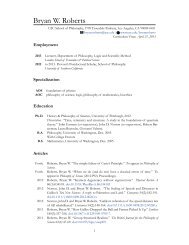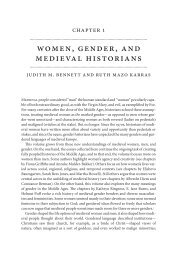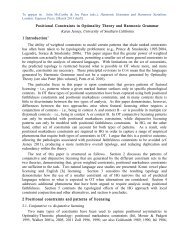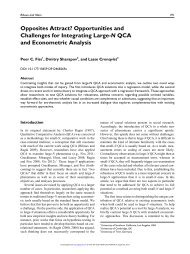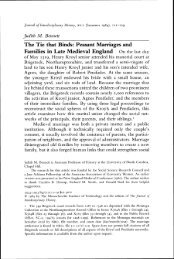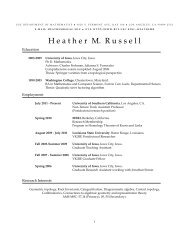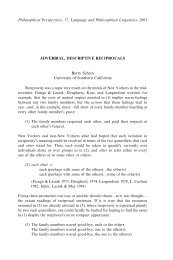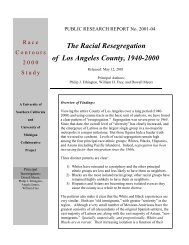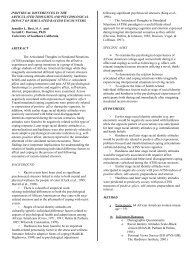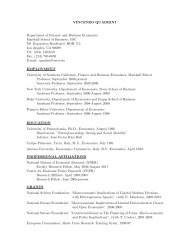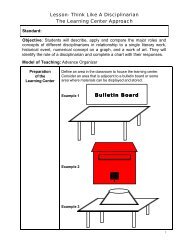Shieva Kleinschmidt [This version differs from the Phil Studies ... - Usc
Shieva Kleinschmidt [This version differs from the Phil Studies ... - Usc
Shieva Kleinschmidt [This version differs from the Phil Studies ... - Usc
Create successful ePaper yourself
Turn your PDF publications into a flip-book with our unique Google optimized e-Paper software.
atoms, and atoms are <strong>the</strong>mselves not made of stuff, it seems that all talk of stuff can be<br />
reduced to talk of things. 16<br />
Ano<strong>the</strong>r way to respond to my argument is to deny <strong>the</strong> existence of a sum of <strong>the</strong><br />
portions of atom-constituting stuff in region r (rejecting premise 4). 17 <strong>This</strong> requires<br />
denying that for any two portions of stuff, <strong>the</strong>re is a sum of those portions. However, this<br />
will not help to avoid colocation in all cases. For instance, consider a Revised Oatmeal<br />
Case: Suppose I am particularly ravenous one morning, and eat all but one oat flake of<br />
my breakfast. We’d want to say that I’ve still got some oatmeal left (exactly located in<br />
<strong>the</strong> region which is exactly occupied by <strong>the</strong> oat), and of course we still want to say that<br />
<strong>the</strong>re is oat-stuff <strong>the</strong>re (also exactly located in <strong>the</strong> same region as <strong>the</strong> oat). But, even<br />
without appealing to sums, this gives us colocation of distinct portions of stuff. Thus, <strong>the</strong><br />
no-sums response to <strong>the</strong> water case will not be helpful in all cases to avoid <strong>the</strong> problem of<br />
colocation that results <strong>from</strong> our allowing constitution to go both ways.<br />
Once again, one might respond to this case by denying that <strong>the</strong> oat-stuff and <strong>the</strong><br />
oatmeal are distinct. But I think <strong>the</strong>re’s a more fundamental worry about <strong>the</strong> anti-sums<br />
response to my argument. The principle that for any portions of stuff, <strong>the</strong>re’s a sum of<br />
those portions, is very intuitive. If we’re to reject it, we need a reason to. I fail to see a<br />
reason. It’s especially hard to see why one would reject that <strong>the</strong>re’s a sum of <strong>the</strong> portions<br />
in my case; I’m not asking us to sum portions on opposite ends of <strong>the</strong> galaxy, or to sum<br />
portions of radically differing stuff kinds. At <strong>the</strong> very least, more would need to be said<br />
to make this response at all appealing.<br />
There are also a couple of ways to attempt to deny that <strong>the</strong> matter and <strong>the</strong> water<br />
are distinct (rejecting premise 7). One way is to deny that <strong>the</strong>re are ever two stuff kinds<br />
instantiated in exactly <strong>the</strong> same region 18 . Michael Burke’s view has this result. Burke<br />
posits stuff only when <strong>the</strong> mass term in question refers to a homeomerous entity 19 (stuff<br />
of which every subportion is a portion of <strong>the</strong> same kind of stuff 20 ). Because <strong>the</strong> water has<br />
16<br />
<strong>This</strong> point was suggested in conversation by Ned Markosian.<br />
17<br />
<strong>This</strong> option, if successful, would help not only with this case but also with <strong>the</strong> revised water case, which<br />
is presented later in <strong>the</strong> paper.<br />
18<br />
<strong>This</strong> would involve rejecting ano<strong>the</strong>r premise in addition to premise 7 – such as 1 and 2, or 3, or 4.<br />
19<br />
Burke, “Coinciding Objects: Reply to Lowe and Denkel.”<br />
20<br />
Zimmerman, “Coincident Objects: Could a ‘Stuff Ontology’ Help?” p. 19. Zimmerman’s account of<br />
homeomerous stuff is as follows: “K is a homeomerous stuff =df Every mass x of K is such that every part<br />
of x has a complete decomposition into a set of masses of K” (Zimmerman, “Theories of Masses and



